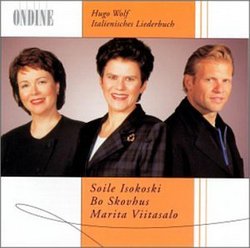| All Artists: Bo Skovhus, Hugo [Composer] Wolf, Marita Viitasalo, Soile Isokoski Title: Hugo Wolf: Italienisches Liederbuch Members Wishing: 1 Total Copies: 0 Label: Ondine Release Date: 11/26/2002 Genres: Pop, Classical Styles: Vocal Pop, Opera & Classical Vocal Number of Discs: 2 SwapaCD Credits: 2 UPC: 761195099827 |
Search - Bo Skovhus, Hugo [Composer] Wolf, Marita Viitasalo :: Hugo Wolf: Italienisches Liederbuch
 | Bo Skovhus, Hugo [Composer] Wolf, Marita Viitasalo Hugo Wolf: Italienisches Liederbuch Genres: Pop, Classical
|
Larger Image |
CD Details |
CD ReviewsWolf with a smile anne_ozorio | United Kingdom | 01/22/2003 (3 out of 5 stars) "This year is the centenary of Hugo Wolf's cruel death, caged, in a lunatic asylum. This brilliant, intense composer in a few short years transformed art song, taking it to heights still not fully appreciated today. Unlike many composers, his work never really fell out of favour. Before the second world war, his songs were passionately loved by the cognoscenti who saw it them the high water mark of romanticism, delighting in its recherché complexity. One of the many admirers included Walter Legge. He and his wife, Elisabeth Schwarzkopf made it their mission to promote Wolf's work to a wider audience. Needing a male voice, they co-opted the young Dietrich Fischer-Dieskau, and the second great era in Wolf interpretation was born. That was fifty years ago. Since then, Wolf's work has become more deeply appreciated, and we are more in tune with the subtleties of his music and his poets than ever before. With the fresh, clear focus of modern singing styles, whole new vistas on Wolf's work are opening up : we are heading towards new ways of understanding his amazing music.Wolf had been born in what is now part of Slovenia, and cherished his "southern" background. For him, and for many northerners, Italy symbolised a more expressive approach to life. These songs are a virtual kaleidoscope of images, like a swathe of postcards, each portraying a vignette of "Italian" experience. Every song is a miniature, but packed with intensity. The poems might be short pen portraits but the music transforms them into glorious, complex dramas. Here we see lovers serenading and flirting, scrapping and making up, plotting to find ways around disapproving mothers. What humour there is here - the lover who is so short that a fly knocks him over (and then you realise that his girl isn't full size either). And what truly cosmic images - the man who thinks he can bury his feelings, but his heart sneaks out by itself to seek the woman he needs. There are no less than forty-six songs here, each individual and unique, flitting wilfully from mood to mood. It is quite a tour de force as the singers must with a few bars of music delineate whole, vivid characters.Soile Isokoski and Bo Skovhus have been singing this cycle together for nearly five years, so there is a chemistry between them which is important in a cycle like this which depends so much on rapid switches of feeling. The "women's" songs are sillier and slightly nasty - perhaps Heyse thought women were airheads - but Isokoski carries off the coquettry without being knowing or maudlin, infusing the flirtation with a warmth of tone and good humour. No saccharin here. Anyone who has heard her vivacious, award winning Strauss Songs will know what to expect. When Bo Skovhus started singing years ago, I could not understand what all the adulation was about. However, over the years his voice has blossomed and opened out. Moreover, he has developed a personal view pf this music : with some singers you get the impression that they have been listening to too many records and usually the same ones, alas ! There is no way I would be without the great benchmark Italienisches Liederbuchs, and memories of live recitals that unfortunately haven't been recorded, but neither would I miss this new version. What I like about it is the fresh, engaging quality of the singing, the verve and the pace. Sure, there are odd moments here and there, but it's a small price to pay for such a spirited rendition. There are many people who think Hugo Wolf is an acquired taste, perhaps put off perhaps by self-consciously arty performances. This is a refreshing antidote - these singers are having fun !"
|

 Track Listings (23) - Disc #1
Track Listings (23) - Disc #1